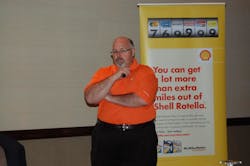GREENSBORO N.C. – Both full and semi-synthetic diesel engine oil blends are increasingly being viewed as the “base oil” for heavy trucks in the future, even though such blends are expected to make up only a very small percentage the market for over the next several years.
At a special engine teardown event organized by Shell Lubricants to show off the capabilities of synthetic – and usually thinner – diesel oil blends, Chris Guerrero, the company’s global marketing manager, noted that the switch in emphasis by the federal government from reducing exhaust emissions from commercial trucks to boosting fuel economy is why demand for semi- and fully-synthetic blends is only expected to keep right on expanding.
“When you look at the total 380 million North American engine oil market – including both the on- and off-highway segments – only 6% to 8% is made up of semi- and fully-synthetic blends,” he explained to Fleet Owner. “Even when you look at the 180 million gallon over-the-road segment alone – of which for-hire and private fleets comprise 100 million gallons – the debate is still centered on whether the cost tradeoffs are worth it.”Yet Dave Waterman (at right), North American marketing manager for the Shell Rotella engine oil brand, noted that a shift is beginning to take place within trucking regarding the veracity of synthetics. For instance, he pointed out that of the 150,000 members of the company’s “My Miles Matter” promotion club, some 37% said they use synthetic oil blends in their truck engines.
That’s why Guerrero stressed that truck and engine makers are now rapidly switching to synthetic oils for their “factory-fill” option – in the main semi-synthetic 10W-30 blends – because they are depending on the engine oil to help deliver fuel economy improvements critical to meeting targets established by federal and state greenhouse gas (GHG) regulations.
“OEMs want thinner oils to help boost fuel economy while not sacrificing wear protection and durability – that’s where synthetics come into play,” he emphasized. “Fleets are now looking more closely at semi-synthetic blends because of their lower price difference when compared to mineral-based oils and how the fuel efficiency gains – which can be as high as 1.6% – benefit their bottom line.”
The engine teardown event Shell is sponsoring here is partly to visually demonstrate that neither wear protection nor oil durability is being sacrificed to attain that greater fuel economy, Guerrero noted.
Three diesel truck engines with between 500,000 to 600,000 miles of operation will be dismantled; one protected by a standard 15W-40 mineral oil, the second with a semi-synthetic 10W-30 blend, and the last filled with a PC-11 prototype rated at 10W-26.
“The big question everyone [in trucking] has right now is, ‘will the lighter synthetics hold up over time?’ And this is why constant field testing is a big deal to us,” Guerrero emphasized. “It’s why developing new engine oil blends is a five-year process: you’ve got to ensure the oil maintains its protective power.”




